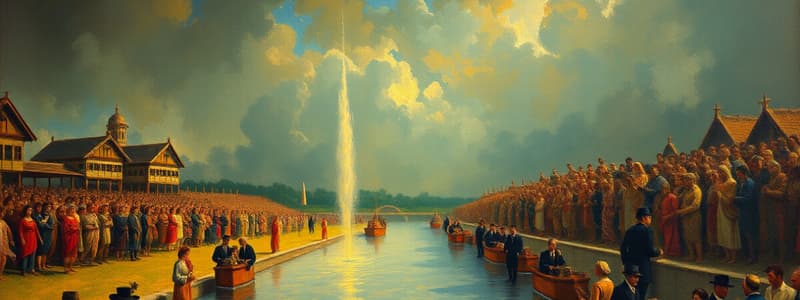Podcast
Questions and Answers
What was the sole event in the first recorded Olympic Games in 776 BC?
What was the sole event in the first recorded Olympic Games in 776 BC?
- Discus throw
- Long jump
- Stadion (running race) (correct)
- Wrestling
Which event in the ancient Olympics was characterized as an ultimate fighting sport?
Which event in the ancient Olympics was characterized as an ultimate fighting sport?
- Wrestling
- Pancratium (correct)
- Equestrian events
- Boxing
In what year were the modern Olympics revived?
In what year were the modern Olympics revived?
- 1880
- 1896 (correct)
- 1900
- 1912
What is represented by the five rings in the Olympic symbol?
What is represented by the five rings in the Olympic symbol?
Which colors were selected for the Olympic flag because every national flag includes at least one of them?
Which colors were selected for the Olympic flag because every national flag includes at least one of them?
What values do the Olympics particularly promote among nations?
What values do the Olympics particularly promote among nations?
Which notable change occurred in the modern Olympics concerning participation?
Which notable change occurred in the modern Olympics concerning participation?
How often are the Olympic Games held?
How often are the Olympic Games held?
Flashcards are hidden until you start studying
Study Notes
History of the Olympics
- The Olympics is an international sporting event held every four years featuring summer and winter games, bringing together athletes from around the world.
- The first recorded Olympic Games took place in 776 BC at Olympia, Greece, honoring Zeus, the king of the Gods.
- Ancient Greek athletes competed naked and only men were allowed to participate.
- Initially, the only event was a running race, known as the stadion, measuring approximately 192 meters.
- Over time, events expanded to include wrestling, long jump, javelin throw, discus throw, and a combative sport called pancratium.
Evolution of Events
- The ancient Olympics added various events around 708 BCE, showcasing skills in multiple disciplines.
- Pancratium was a notable event, characterized as an ultimate fighting sport with minimal rules (no biting, no eye gouging).
- The ancient Olympics continued until they were banned in AD 393 by the Romans.
Modern Revival
- The Olympics were revived in 1896 in Athens, Greece, leading to their current iteration every four years.
- Women's participation was introduced, allowing female athletes to showcase their talents.
- Today, thousands of athletes from 206 countries compete in approximately 33 sports.
Olympic Symbolism and Values
- The Olympic symbol features five rings representing the five inhabited continents, promoting global unity.
- Six colors in the Olympic flag (blue, yellow, black, green, red, and white) were selected because every national flag includes at least one of these colors.
- The Olympics serve as a platform to promote peace, friendship, and cultural exchange among nations.
Inspiration and Legacy
- The Olympics inspire young athletes to aspire toward greatness and achieve their dreams in sports.
- The event fosters opportunities for diverse cultures to engage and celebrate athletic excellence.
History of the Olympics
- The Olympics is a global event held every four years, featuring both summer and winter games.
- The first recorded Olympic Games were in 776 BC in Olympia, Greece, dedicated to Zeus, the chief deity in Greek mythology.
- Participation was exclusive to men, and athletes competed naked, representing a cultural norm of the time.
- The initial competition was a running race, known as the stadion, approximately 192 meters in distance.
- The range of events expanded to include wrestling, long jump, javelin throw, discus throw, and pancratium, a mixed martial art.
Evolution of Events
- By 708 BCE, the Olympics evolved with the addition of various events, expanding the athletic disciplines showcased.
- Pancratium was recognized for its minimal rules, allowing a broader range of combat techniques except biting and eye gouging.
- The ancient Olympic Games were ultimately banned in AD 393 by the Roman Empire, marking the end of this tradition for over a millennium.
Modern Revival
- The modern Olympic Games were reestablished in 1896 in Athens, marking a significant cultural revival.
- Women's involvement was introduced, enhancing the diversity of competitions and representation in the Games.
- Currently, the Olympics feature thousands of athletes from 206 countries, competing in around 33 different sports.
Olympic Symbolism and Values
- The Olympic symbol consists of five rings representing the five inhabited continents, symbolizing global unity and cooperation.
- The Olympic flag includes six colors—blue, yellow, black, green, red, and white—the selection reflecting common colors found in national flags worldwide.
- The Olympics promote ideals such as peace, friendship, and cultural exchange among diverse nations, serving as a platform for global solidarity.
Inspiration and Legacy
- The Olympics encourage young athletes to aim for excellence and pursue their dreams in sports.
- The event fosters engagement among various cultures, celebrating athletic achievements and promoting a sense of shared global identity.
Studying That Suits You
Use AI to generate personalized quizzes and flashcards to suit your learning preferences.




